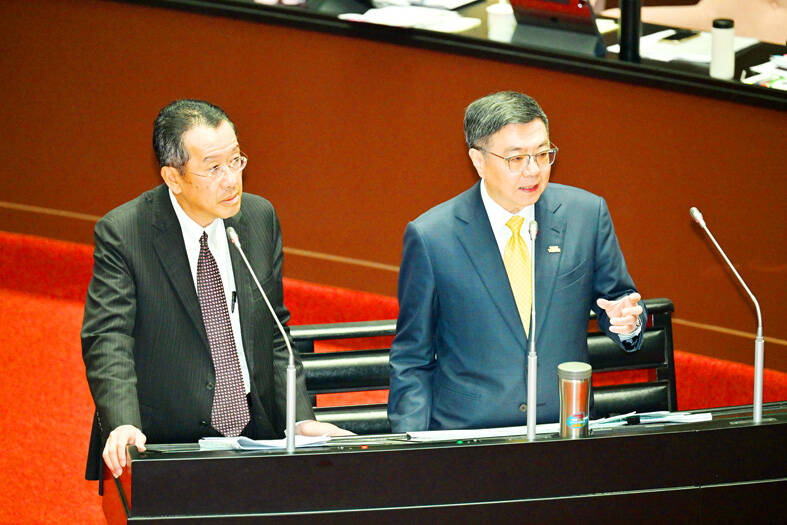Government agencies are expected to draft a plan within one month that would amend the Military Trial Act (軍事審判法) to reinstate courts martial, Premier Cho Jung-tai (卓榮泰) said at the legislature in Taipei yesterday.
The premier’s comments came after President William Lai (賴清德) on Thursday following a national security meeting announced that China constituted “a hostile foreign force” and that the government would seek to reinstate the military court system to handle military-related criminal cases involving active-duty members of the armed forces, amid increasing Chinese infiltration attempts.
Democratic Progressive Party Legislator Lai Jui-lung (賴瑞隆) asked when the Cabinet would present supplementary measures to the announcement.

Photo: Tien Yu-hua, Taipei Times
All agencies have been instructed to establish task forces and formulate action plans to realize the president’s instructions, Cho said.
The government has contingencies prepared for such a development and agencies need to communicate with each other to finalize plans within the month, Cho said.
The current military trial system is only to be used during war time, Chinese Nationalist Party (KMT) Legislator Alicia Wang (王育敏) said.
“Is the president’s instruction to restore such a system a precursor that Taiwan is to enter wartime preparations?” Wang asked.
The amendment targets specific actions, such as rebellion among serving military personnel, collaboration with the enemy, leaking intelligence, abandonment of duty or disobeying direct orders, Cho said.
“The abolition of military courts in 2013 was in response to a public outcry following human rights infringements against serving military personnel, but we are now faced with foreign actors enticing active military personnel to act in ways that are against the country’s interests,” he said.
Lai’s 17 strategies to counter Chinese infiltration, from reinstating the military court system to enhancing scrutiny of immigrants from China, Hong Kong and Macau, have caused the public to feel that their freedom of speech and movement, as well as cross-strait interactions, are being threatened, Wang said.
“The proposed changes make it seem that exchanges with China would be seen as taking the side of the Chinese Communist Party,” she added.
Fostering healthy and orderly cross-strait interactions is still a standing government policy, Cho said.
Separately yesterday, Minister of National Defense Wellington Koo (顧立雄) — who in 2013 supported the abolition of the military court system — said that he has not changed his stance, adding that the Lai administration’s plan to reinstate military courts should be seen as fostering a new system that observes legal procedure and is conducted fairly, rather than the reinstatement of the previous system.
The Ministry of National Defense is proposing amendments to legislation to ensure that courts martial would not be seen as an extension of an authoritarian regime and are instead part of a system that maintains military discipline while upholding human rights, Koo said.
Additional reporting by Fang Wei-li

Chinese spouse and influencer Guan Guan’s (關關) residency permit has been revoked for repeatedly posting pro-China videos that threaten national security, the National Immigration Agency confirmed today. Guan Guan has said many controversial statements in her videos posted to Douyin (抖音), including “the red flag will soon be painted all over Taiwan” and “Taiwan is an inseparable part of China,” and expressing hope for expedited reunification. The agency last year received multiple reports alleging that Guan Guan had advocated for armed reunification. After verifying the reports, the agency last month issued a notice requiring her to appear and explain her actions. Guan

The Kaohsiung Tourism Bureau audited six hotels in an effort to prevent price gouging ahead of Korean band BTS’ concert tour in the city scheduled for Nov. 19, 21 and 22 this year. The bureau on Friday said that the audits — conducted in response to allegations of unfair pricing posted on social media — found no wrongdoing. These establishments included the local branches of Chateau de Chine, Hotel Nikko, My Humble House, and Grand Hai Lai, it said, adding that the Consumer Protection Commission would have penalized price gougers had the accusations been substantiated. The bureau said the Tourism Development Act

BACK TO WINTER: A strong continental cold air mass would move south on Tuesday next week, bringing colder temperatures to northern and central Taiwan A tropical depression east of the Philippines could soon be upgraded to be the first tropical storm of this year, the Central Weather Administration (CWA) said yesterday, adding that the next cold air mass is forecast to arrive on Monday next week. CWA forecaster Cheng Jie-ren (鄭傑仁) said the first tropical depression of this year is over waters east of the Philippines, about 1,867km southeast of Oluanpi (鵝鑾鼻), and could strengthen into Tropical Storm Nokaen by early today. The system is moving slowly from northwest to north, and is expected to remain east of the Philippines with little chance of affecting Taiwan,

The military yesterday said it has located the flight data recorder, or black box, of an F-16V jet that disappeared off eastern Taiwan earlier this month, and it would soon deploy a salvage team to try to retrieve it. Air Force Command Headquarters said that while it had pinned down the location of the black box, it was still searching for the aircraft’s sole pilot, air force Captain Hsin Po-yi (辛柏毅). Without providing details, the air force said it had located the black box days after detecting some intermittent signals and would now engage a team of professionals to retrieve it. The air